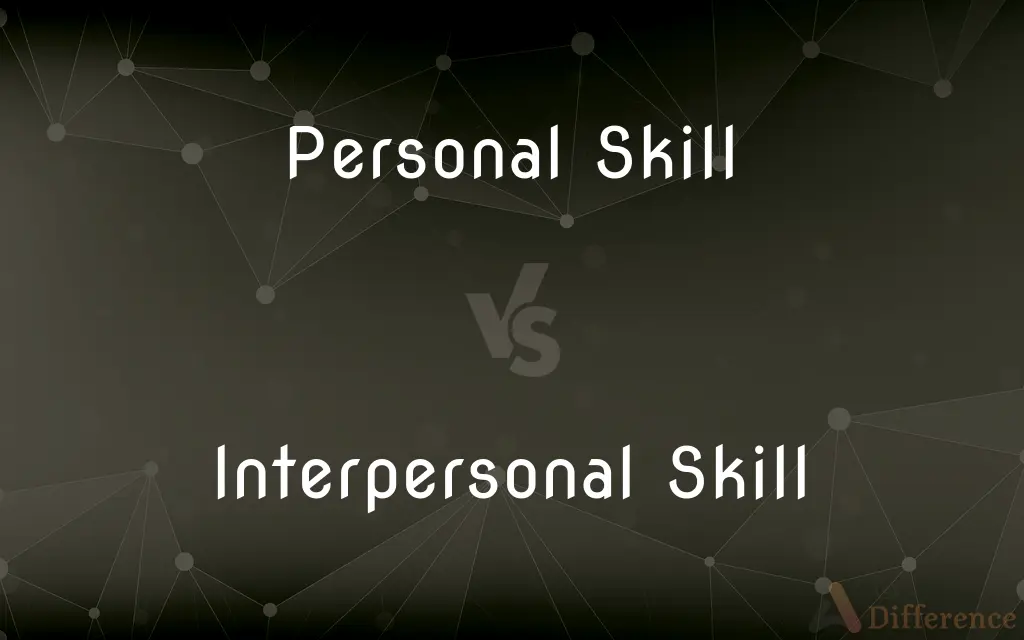Personal Skill vs. Interpersonal Skill — What's the Difference?
By Fiza Rafique & Urooj Arif — Published on February 25, 2024
Personal skills are individual capabilities, like self-discipline, while interpersonal skills involve interacting with others, such as communication and teamwork.

Difference Between Personal Skill and Interpersonal Skill
Table of Contents
ADVERTISEMENT
Key Differences
Personal skills, often referred to as intrapersonal skills, revolve around self-management and self-awareness, enabling individuals to navigate their personal and professional lives effectively. These include traits and abilities like resilience, time management, and critical thinking, which contribute to one's personal development and professional competence. Interpersonal skills, on the other hand, are centered on interaction and communication with others. They encompass a range of abilities such as effective communication, empathy, teamwork, and conflict resolution, crucial for building and maintaining positive relationships in both personal and professional contexts.
Personal skills are foundational for individual success and self-improvement, while interpersonal skills are key to collaborative success and are often pivotal in team-based environments and leadership roles. The development of personal skills can enhance one’s ability to develop interpersonal skills, as effective self-management often leads to better communication and collaboration with others.
In the workplace, personal skills contribute to individual performance and efficiency, whereas interpersonal skills are vital for fostering a collaborative and inclusive work culture. Employers value both skill sets for their complementary roles in achieving personal excellence and collaborative success.
The interplay between personal and interpersonal skills is dynamic; strong personal skills can bolster interpersonal interactions, and effective interpersonal engagement can, in turn, enhance personal growth and self-understanding. Mastery of both skill sets is considered ideal for holistic personal and professional development.
Comparison Chart
Focus
Self-awareness and self-management
Interaction and communication with others
ADVERTISEMENT
Examples
Time management, resilience, critical thinking
Communication, teamwork, empathy, conflict resolution
Key Benefit
Enhances individual effectiveness and personal growth
Facilitates positive relationships and collaborative success
Application
Personal development, individual tasks, and self-improvement
Teamwork, leadership, networking, and community engagement
Development Approach
Self-reflection, personal challenges, and education
Social interaction, feedback, and collaborative activities
Compare with Definitions
Personal Skill
Critical thinking for problem-solving.
Critical thinking enabled her to find innovative solutions to complex issues.
Interpersonal Skill
Teamwork for collaborative success.
His ability to work well in a team contributed to the project's success.
Personal Skill
Ability to manage one's time effectively.
She improved her productivity by mastering time management, a crucial personal skill.
Interpersonal Skill
Empathy for understanding others' perspectives.
Her empathy made her an excellent listener and friend.
Personal Skill
Self-discipline for goal achievement.
Her self-discipline was key to achieving her fitness goals.
Interpersonal Skill
Leadership for guiding and motivating others.
His leadership skills inspired his team to achieve their best.
Personal Skill
Resilience in the face of challenges.
His resilience helped him overcome numerous setbacks in his career.
Interpersonal Skill
Conflict resolution for maintaining harmony.
His conflict resolution skills were crucial in resolving team disputes.
Personal Skill
Adaptability in various situations.
His adaptability allowed him to thrive in diverse work environments.
Interpersonal Skill
Effective communication for clear expression.
Her clear and concise communication improved team understanding.
Common Curiosities
Can personal skills affect interpersonal skills?
Yes, strong personal skills like self-awareness can enhance one's interpersonal abilities, such as empathy and communication.
Can personal skills be developed through work experience?
Yes, work challenges and responsibilities can significantly contribute to developing personal skills like time management and adaptability.
What role do interpersonal skills play in leadership?
Interpersonal skills are crucial in leadership for effective communication, team motivation, conflict resolution, and building positive relationships.
Is empathy considered a personal or interpersonal skill?
Empathy is primarily an interpersonal skill as it involves understanding and relating to the feelings of others.
Are interpersonal skills learned or innate?
Interpersonal skills can be innate to some degree but are largely developed through social interactions and experiences.
Do cultural differences affect interpersonal skills?
Cultural differences can impact the expression and interpretation of interpersonal skills, necessitating cultural sensitivity.
Are interpersonal skills important for all jobs?
While their importance varies by role, interpersonal skills are valuable in nearly all professional settings for teamwork and client interactions.
How can I improve my personal skills?
Improving personal skills involves self-reflection, setting personal challenges, and possibly seeking educational resources or training.
Can strong personal skills compensate for weaker interpersonal skills?
While strong personal skills are valuable, they may not fully compensate for weak interpersonal skills, especially in roles requiring teamwork and communication.
Can interpersonal skills improve personal well-being?
Yes, effective interpersonal interactions can enhance personal well-being by fostering positive relationships and social support.
Do employers value personal skills as much as interpersonal skills?
Employers value both, as personal skills contribute to individual efficiency and self-management, while interpersonal skills enhance team dynamics and client relations.
Is it easier to develop personal or interpersonal skills?
The ease of development can vary widely among individuals based on personal inclinations and life experiences.
How do interpersonal skills impact teamwork?
Strong interpersonal skills facilitate clear communication, mutual respect, and effective collaboration, enhancing teamwork.
How do personal and interpersonal skills differ in assessment?
Personal skills are often assessed through self-evaluation and personal achievements, while interpersonal skills are evaluated through social interactions and feedback from others.
How do personal and interpersonal skills interact in conflict situations?
Personal skills like self-regulation can help manage emotions, while interpersonal skills are used to communicate and resolve conflicts effectively.
Share Your Discovery

Previous Comparison
Central Time vs. Mountain Time
Next Comparison
Sushi Rice vs. White RiceAuthor Spotlight
Written by
Fiza RafiqueFiza Rafique is a skilled content writer at AskDifference.com, where she meticulously refines and enhances written pieces. Drawing from her vast editorial expertise, Fiza ensures clarity, accuracy, and precision in every article. Passionate about language, she continually seeks to elevate the quality of content for readers worldwide.
Co-written by
Urooj ArifUrooj is a skilled content writer at Ask Difference, known for her exceptional ability to simplify complex topics into engaging and informative content. With a passion for research and a flair for clear, concise writing, she consistently delivers articles that resonate with our diverse audience.














































